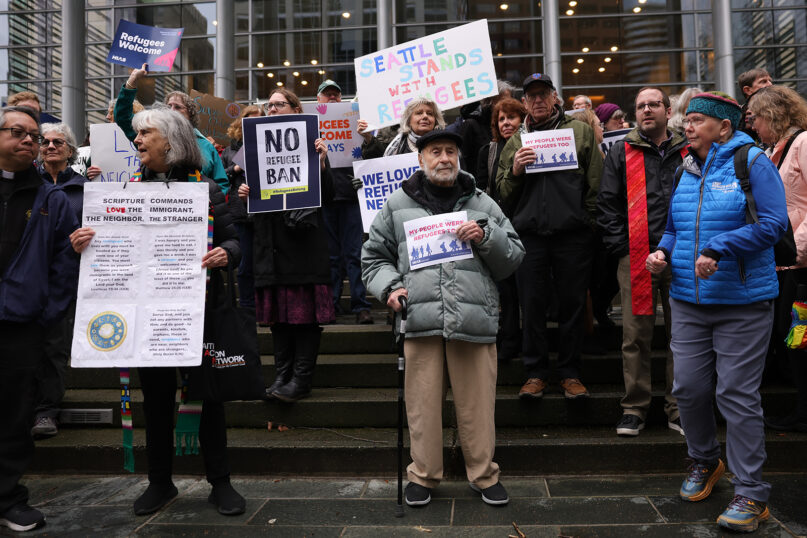
(RNS) — In late February, U.S. District Judge Jamal Whitehead ordered the Trump administration to resume accepting refugees cleared under the federal refugee admissions program, which President Donald Trump froze by executive order on the first day of his second term.
In a lengthy ruling siding with the plaintiffs, which included a trio of faith-based groups that help resettle refugees, the judge spelled out his reasons for granting a preliminary injunction, arguing “the record shows concrete and severe harms to the individual and organizational plaintiffs flowing directly from” the administration’s decision to freeze the program.
“These harms are mostly irreversible and warrant immediate intervention to stop more harm from befalling Plaintiffs,” Whitehead added.
Three months later, the administration has not begun to admit the estimated 128,000 refugees already approved to enter the U.S., roughly 12,000 of whom had travel plans booked before Jan. 20, when Trump issued his order.
The faith groups involved in the case say the harm to refugees has only worsened. The refugees — many who fled religious persecution, brutal war and relentless violence around the globe — remain locked in limbo, the groups say, some in refugee camps where they wait to hear whether they will again be approved to enter America.
“As if they haven’t been through enough already,” said Mark Hetfield, head of HIAS, a Jewish agency that resettles refugees and one of the religious organizations suing the Trump administration. Hetfield said the ongoing pause of the program, which he called “cruel,” has been “completely devastating” for the refugees he serves.

Mark Hetfield discusses the U.S. Refugee Admissions Program during a panel at the Religion News Association conference, April 3, 2025, in Arlington, Va. (RNS photo/Kit Doyle)
The faith groups say the administration has claimed in court it cannot resettle refugees, but the groups point out that 59 white Afrikaners from South Africa, who had not previously been approved, were fast-tracked to refugee status in mere months and resettled in May.
After Whitehead’s initial ruling, attorneys for the Trump administration quickly filed an appeal and abruptly terminated agreements with faith-based refugee resettlement agencies that had joined the suit, which the plaintiffs called a “blatant violation” of the court’s order.
“The government has certainly been using delay tactics thus far, and the district court has been having none of it,” said Mevlüde Akay Alp, part of the litigation team with the International Refugee Assistance Project. The group is working with plaintiffs in the case, such as HIAS, Church World Service and Lutheran Community Services Northwest.
She was seconded by Hetfield, who accused the government of “clearly trying to do everything they can to delay the implementation or to narrow the implementation of this.”
Last week, the 9th U.S. Circuit Court of Appeals ruled that Whitehead’s initial injunction applies to individuals who had travel booked on or before Jan. 20 and who had “special reliance interests” in coming to the United States. Whitehead has appointed a special neutral master to adjudicate which refugees meet that description.

Martin Bernstein, 95, at center, whose parents were refugees, holds a sign as people gather outside the U.S. District Court after a federal judge blocked President Donald Trump’s effort to halt the nation’s refugee admissions system, Feb. 25, 2025, in Seattle. (AP Photo/Ryan Sun)
In response to questions, the White House referred Religion News Service to the Department of Homeland Security, which sent a statement made by Assistant Secretary Tricia McLaughlin in a CNN interview, claiming the administration has “granted asylum to 8,666 individuals since January 20, regardless of color or creed.”
McLaughlin’s statement appears to conflate two different forms of immigration: asylum-seekers, who have already come to the U.S. and are processed through a separate system, and refugees, who apply from abroad and submit to substantial vetting before being allowed into the U.S.
A representative for the U.S. State Department did not reply to questions about the case.
Akay Alp said the government has suggested it cannot restart the program because of severe cuts at the resettlement agencies, which were forced to lay off staff and radically reduce their operations when the government abruptly halted their services and in at least one case refused to pay for work performed before Trump assumed office.
“One of the things that the government is saying is that the U.S. refugee admissions program infrastructure has been destroyed by the suspension of funding to the organizations that carry out this work, and that’s one of the reasons why they didn’t move to admit refugees more quickly after the Court issued its injunction,” Akay Alp said. “Of course, that’s entirely a problem of the government’s own making.”
Hetfield said, however, that his agency still had the capacity to receive refugees. “If they continue to starve the system and to tear it, rip it to shreds, we will not have that capacity — but as of right now, we still do.”
In April, the U.S. Conference of Catholic Bishops announced it would end its refugee resettlement work because of the administration’s instransigence. Earlier this month, Episcopal Migration Ministries did the same, citing moral concerns with resettling the South Africans ahead of other approved refugees.
Republicans who have championed the cause of refugees in the past, including Sen. James Lankford and former Sen. Marco Rubio, who is now secretary of state, have done little to draw attention to the case. But Hetfield also expressed frustration that Democrats who have rallied against the Trump administration’s wrongful deportation of Kilmar Abrego Garcia to El Salvador have paid less attention to the plight of refugees.
“It’s amazing how individuals who have been wrongfully removed from this country have been getting a lot of attention, but here we’re talking about 128,000 people, all of whom have faced life-threatening situations and been put in a position of being rescued and resettled by the United States government, and then had that offer taken away from them,” Hetfield said.
Last week at a hearing of the Senate Committee on Foreign Relations, Sen. Tim Kaine, a Virginia Democrat, brought up the freezing of the program while noting the administration’s recent decision to admit 59 Afrikaners from South Africa, asking Rubio, “Do you think Afrikaner farmers are the most persecuted group in the world?”
Rubio responded by insisting Afrikaners face persecution in South Africa and argued the refugee program suffers from a “volume problem” of not being able to admit all persecuted people. He also said the program would “prioritize people coming into the country on the basis of the interests of this country.”

White South Africans demonstrate in support of U.S. President Donald Trump in front of the U.S. Embassy in Pretoria, South Africa, Feb. 15, 2025. (AP Photo/Jerome Delay, File)
The response was an about-face for Rubio, who was one of 18 senators from both parties who sent a letter in 2019 to officials in Trump’s first administration speaking out against rumored plans to zero out refugee admissions.
“At a time when we are facing the ‘highest levels of displacement on record,’ according to the United Nations Refugee Agency, we urge you to increase the refugee resettlement cap and to admit as many refugees as possible within that cap,” read the letter, which was spearheaded by Lankford and Chris Coons, a Delaware Democrat, and signed by Sen. John Thune, a South Dakota Republican who is now Senate majority leader.
None of the Republican senators responded to requests for comment on the refugee program’s status. Coons’ office responded in a statement, noting Americans’ “marrow deep” support for accepting refugees and saying that freezing the program “does nothing to make us safer or reduce costs; it’s cruelty for cruelty’s sake, and Senator Coons will continue doing all he can to end it.”
Several groups filed amicus briefs in support of the plaintiffs this week, including attorneys general from 20 states as well as faith groups such as Lutheran Services Carolinas, Jesuit Refugee Service, JustFaith Ministries, the Council on American-Islamic Relations California and Bet Tzedek Legal Services.
“Despite their differences, the faiths to which amici, their staffs, and their volunteers adhere place service to the stranger — refugees, immigrants, neighbors — at the core of their practices and systems of belief,” read part of a brief filed by a group of religious organizations, which outlined a variety of theological arguments from different faith traditions in support of refugees.
But as the legal battle drags on, Akay Alp said, refugees who cannot enter the country continue to languish. One of the individual plaintiffs in the case, identified as Pacito, who fled Congo when he was 13 years old, refused to believe his flight to the U.S. had been canceled two days before he was supposed to leave, according to the lawyer. Instead, he slept outside the travel booking facility with his wife and infant child, hoping there had been a mistake.
“He literally did not believe, could not believe, that it could be true,” said Akay Alp.
